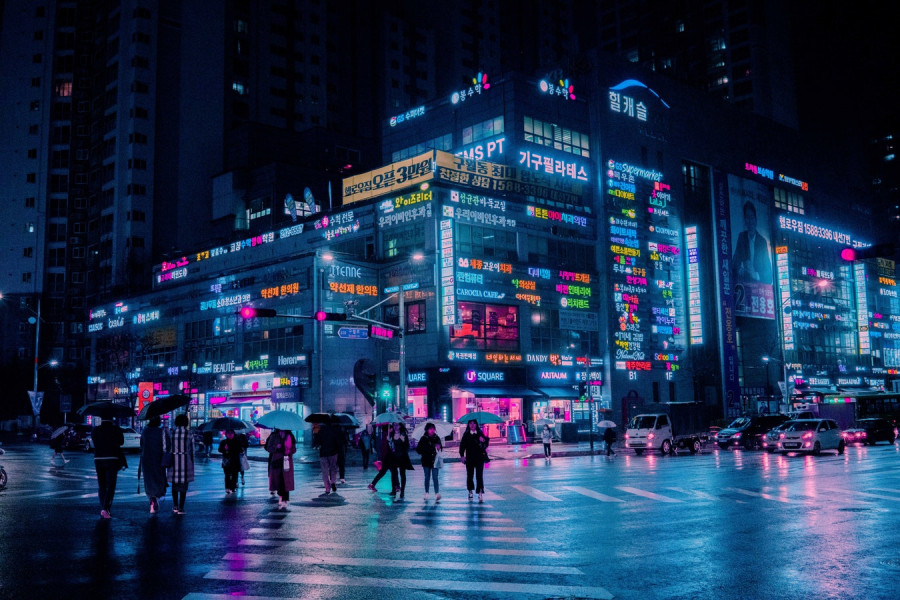Miscellaneous
Narayan Wagle’s Koreana Coffee Guff makes for an engaging read owing to its lucid, freewheeling narrative style
Narayan Wagle might have taken the Nepali literary scene by storm with 2005’s Madan Puraskar-winning Palpasa Café, but before that, he had already made a name for himself as the writer of the widely-followed Coffee Guff columns, published weekly in Kantipur’s Koselee supplement.
Timothy Aryal
Narayan Wagle might have taken the Nepali literary scene by storm with 2005’s Madan Puraskar-winning Palpasa Café, but before that, he had already made a name for himself as the writer of the widely-followed Coffee Guff columns, published weekly in Kantipur’s Koselee supplement. The columns were beloved for their freewheeling prose and conversational tone. They diverted starkly from the formal prose style of most newspaper writing, and were peppered with plenty of non-sequiturs and fragments.
Wagle returns to that narrative vein in his new book, Koreana Coffee Guff, released last month by Nepalaya Books.
It’s easy to surmise from the title itself that the book recounts the author’s travels to the Korean peninsula. It’s been billed as ‘creative non-fiction’ and it reads like a novel, recalling writers like 20th century French novelist Marcel Proust, known for his seminal six-volume autobiographical novel In Search of Lost Time, or contemporary Norwegian novelist Karl Ove Knausgaard.
Koreana Coffee Guff begins with the narrator starting his journey to South Korea and ends as he returns home. But there is so much more to this book than just a travel memoir.
We find the author at Incheon International Airport in wintertime. Though the author has already travelled to the country a few times before, it’s his first visit during winter. It wouldn’t be untoward to say that winter and its mist make for characters in themselves in this book.
The first chapter, however, is rather jarring, with Wagle shifting from the physical description of the new land to his internal monologues so frequently. The narrator talks with a chauffeur who takes him to a venue where an Asian creative writing workshop is taking place, one that our narrator is also participating in. In the very first chapter, the narrator manages to muse about things as diverse as data breaching to current affairs like the feud between North Korea and the US, and a New York Times cartoon, all while managing to provide the reader with a glimpse into the socio-economic background of the taxi driver.
The book gets smoother as you get accustomed to Wagle’s style. In every ensuing chapter, he shifts frequently from the physical to the metaphysical. Much like the works of Proust and Knausgaard, the book has two veins of narration. One is the physical where the narrator describes what’s happening around him. The other, which makes for a more significant portion, is where the author travels inside his own mind. But even so, it doesn’t read completely like an internal monologue but like a dialogue he is having directly with the reader. It’s when the author is writing in the latter vein that he shines the brightest. He is often funny and beams with a childlike curiosity and glee. “Why is the feather of maize found in every other field invariably brown, I don’t know,” he wonders at one point. “Whether in North America or the South, South Africa or North Korea.”
While the author often muses about mundane ideas such as the aforementioned, he also imparts deep, existential musings: “Life is an act. It’s a journey. A story. A dialogue. Demeanours. Style. We can’t play our own role ourselves. It’s governed by greed, society, aspirations, and local and glocal governments.”
Here, Wagle manages to muse about almost everything under the sun—from the evolution of words to washing machines and the culture of asking the right questions and its contributions for a prosperous society. Everything fits together and it seems the author always has a poem ready—from Nepali poet Manjul to South Korean poet Ryu Shiva—to encapsulate each passing thought.
While the book is fairly engaging for the most part, it drags a little when the reader approaches the end of the first half as the author goes into a long internal monologue. But besides that, it’s a book that you can’t put down.
Wagle writes at point, “It seems they have no idea that a good book is one that is not written by the author, but instead, where the book writes the author. I too want to write one such book.”
But does he know, that he has, in fact, already written one?

Koreana Coffee Guff
Author: Narayan Wagle
Publisher: Nepalaya
Pages: 242
Price: Rs 495




 10.45°C Kathmandu
10.45°C Kathmandu










